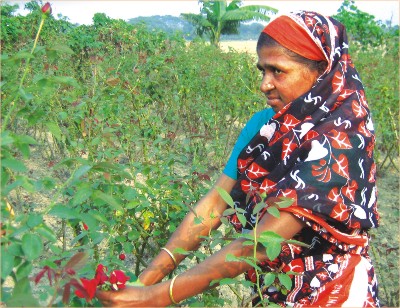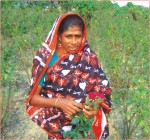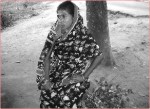| From Jessore
The Flower Business

Barison Begum is the first woman micro-entrepreneur in the field of floriculture in Patuapara, Jhikorgacha village, Jessore. She and her husband Lokman Morol used to live in a small hut with two sons and three daughters. They would barely be able to make ends meet with their earnings from a small shop owned by Lokman. One morning she saw Sher Ali, a floriculturist from Patuapara at the Jhikorgacha Gadkhali market, with three bundles of marigolds, about 20 or more sticks of roses and tuberoses. Just then two businessmen from Dhaka got down from the bus and bought all of Sher Ali's flowers. She decided to become a floriculturist after she consulted Sher Ali, who convinced her that flowers were high in demand. She encouraged her husband and together, with tuberose seeds from Calcutta, on a land of 2 acres, she started her flower business in 1999 at the age of 31. The first year she made a profit of Tk. 200,000. Then Barison leased out another 4 acres of land, and on a stretch of 7 acres of land she cultivated tuberoses, gladiolas, and roses. Barison Begum is now a member of the Rural Reconstruction Federation in Gadkhali. She started out by taking a loan of Tk. 5000 and now she stands on a loan of Tk. 70, 000. She cultivates her flowers on seven acres of land. She no longer lives in the small hut but in a new brick house with four bedrooms which is under construction. With a good amount of cash at hand, she now has about 60 men and women working in her flower garden business. Star Insight talked to her about some of her insights into the success of this kind of business.
 Why do you consider yourself to be a successful micro-entrepreneur? Why do you consider yourself to be a successful micro-entrepreneur?
There was once a time when I used to live in a little hut with my husband and five children. At that time we used to rely on the earnings from a small shop to feed a family of seven. All I could think of then was about how to increase our income. After seeing Sher Ali selling his flowers and making money, I decided to be a floriculturist. In 1999 my husband and I started growing flowers with tuberose seeds from Calcutta on 2 acres of land. I did well in my first year. Now we live in a much better house and have more disposable income. I am now responsible for feeding the families of all 60 of my workers and I have successfully raised the living standard of my family. I guess in general all that would make me a successful micro-entrepreneur.
How do you manage both the business and your family? Can you compare your situation to that of other women in the society who are not micro-entrepreneurs?
I always plan my chores ahead of time and do what needs do be done around the house for the day. As for my business, I discuss it with my husband. Two of my children help me as well. They know how many day laborers are needed and they also know a lot about the planting, fertilizer cutting and packaging. Compared to other women who are not entrepreneurs, I am more self-reliant. I am a self-sufficient woman. I am proud of my business.
 What kind of challenges did you face being a woman in enterprise? How did you handle them? What kind of challenges did you face being a woman in enterprise? How did you handle them?
When I first started working in the fields with my husband, the elders of the region and others made fun of us. I was offered no form help from any of my fellow villagers. I had a lot of problems traveling back and forth to the market, carrying fertilizers, selling goods. My husband and my two children were my only help. They assisted me in sorting and dealing with these issues.
How does your business benefit the people of your village?
When my husband and I started the cultivation ourselves on 2 acres of land, people made fun of us. People started to show interest and excitement after seeing our first profits. Interest is growing and 80% of the land in Patuapara is now used for floriculture. Through this flower business, my family is now financially stronger and has the chance to help out with work in the fields.
What are your plans for the future growth of your business?
I want my floriculture business to expand further in the future. I want to motivate the women in Jhikorgacha to be floriculturists so that they can be self-sufficient and successful. With the help of other NGOs and the Agriculture Department I want to collect seeds of rare ornamental flowers and expand my production line.

Can you explain the daily process involved in floriculture?
Everyday at 3 o'clock I get around 40 day workers to pick the flowers. The flowers are then cleaned with fresh water and the roses, tuberoses and gladiolas are gathered in sticks of 50 and 100 and marigolds are packed into baskets in groups of 500 and 1000. The next morning the flowers are loaded onto a van bound for the Jhikorgacha Gadkhali market where they are sold.
How many men and women do you employ? How many are poor or disabled?
I do not have any full-time employees for my flower business. Everyday I hire around 60 men and women day workers. All of these people are very poor, and working for me helps them feed themselves.
 Has your business ever been in breach of the loan repayment schedule? Has your business ever been in breach of the loan repayment schedule?
My business is such that after paying my workers and the expenses of my household, I have enough money left to pay off my debts. I have never had to evade paying off loans.
Can you comment on the financial durability of your business?
The demand of flowers is high in the local and international markets. Flowers are used for decorating in all kinds on events, special days and celebrations. This causes a high market price. Floriculture is a very profitable business and I wish to expand. I do consider my business durable.
Can you comment on your micro credit loan scheme?
I am a member of the Rural Reconstruction Federation in Gadkhali. I have taken micro credit loans from RRF under their rural micro credit (RMC) program and have always paid them as per agreement. I have never missed a payment and I have taken out a total of 6 RMC loans, increasing the amount as every time. Then I switched to their micro enterprise loan (MEL) program and from there I took out an initial loan of 50,000 taka and now I am on my 2nd loan under MEL of 70, 000 taka.
 Has your business ever been affected by natural disasters? Has your business ever been affected by natural disasters?
It has never been greatly affected by natural disasters. The 2004 flood caused some of my flower plants to die, so I had to replace them with some new seeds that I purchased. Regularly changing the flower beds took care of the problem.
How does your business affect the environment?
My micro business, floriculture is not harmful for the environment. Quite the contrary, because of my business many events are now being decorated with flowers. Furthermore, the gardens give people quite a view.
Do you keep proper books for your accounts?
So far I haven't been keeping any documents for the accounts of my business. In the coming fiscal year, I would hope to hire an accountant to keep my books.
Copyright
(R) thedailystar.net 2008
|
